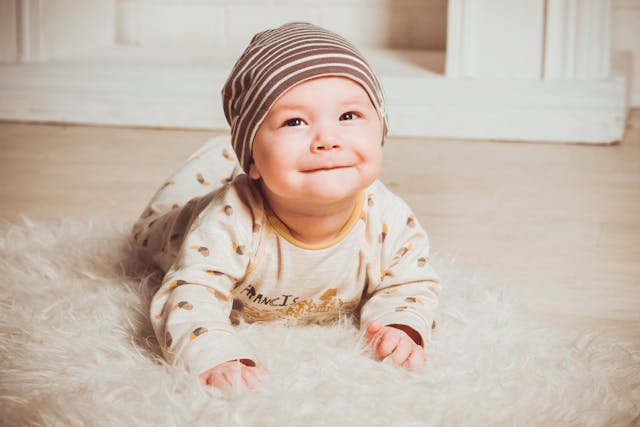Hey there, wonderful parents and caregivers! Have you ever found yourself mesmerized by the adorable smiles of your little ones? Those heartwarming grins aren’t just cute; they’re early emotional expressions that tell us so much about our babies’ development and well-being. Let’s dive into the fascinating world of baby smiles and uncover the science behind these precious moments!
In This Article
When Do Babies Start Smiling? What Age Do Babies Smile?
Ah, the magical moment when your baby flashes their first smile! Typically, babies start smiling around 6 to 8 weeks of age. These early smiles are often reflexive, involuntary responses to stimuli like a gentle touch or a comforting voice. As they grow, babies begin to develop social smiles, which are intentional and occur in response to seeing familiar faces or hearing familiar voices. So, if you’ve been eagerly waiting for that first smile, hang in there—it’s worth the wait!
The Development of Baby Smiles: Types and Meanings
Baby smiles come in different forms, each with its own meaning and significance. Social smiles are those genuine, heartwarming grins your baby gives when they see your face or hear your voice. On the other hand, reflexive smiles are more spontaneous and can happen during sleep or in response to internal sensations.
These smiles are not just adorable; they’re also essential emotional cues. A baby’s smile can signify happiness, comfort, or even a sense of security. So, the next time your baby beams at you, know that they’re communicating their feelings in the most delightful way possible!
The Neurological Perspective: Baby Smiles and Brain Development
Did you know that baby smiles are closely tied to brain development? As your baby smiles, their brain releases endorphins and oxytocin—hormones associated with feelings of happiness and bonding. This neurological connection highlights the importance of emotional interactions in shaping your baby’s brain and overall development.
When Do Babies Smile Back? Reciprocal Smiling Explained
One of the most heartwarming experiences for parents is when their baby smiles back at them for the first time. This reciprocal smiling usually begins around 2 to 3 months of age and marks a significant milestone in your baby’s social development. So, keep engaging with your little one through smiles, cuddles, and playful interactions to foster this beautiful bond!
What Do Babies Dream About When They Smile?
Ever noticed your baby smiling in their sleep? It’s a common sight that often leaves parents wondering: what do babies dream about when they smile? While we can’t know for sure, some experts suggest that these dream-induced smiles could be linked to their experiences, sensations, or even simple neural firings during REM sleep.
The Importance of Responsiveness: Encouraging Positive Smiling Interactions
Your reactions to your baby’s smiles play a crucial role in their emotional development. By responding positively to their smiles, you’re reinforcing their feelings of happiness and security, which in turn strengthens the parent-child bond. So, cherish those smiling moments, respond with love and warmth, and watch your baby thrive!
Cultural and Environmental Influences: Shaping Baby Smiling Behavior
Cultural norms and environmental factors can influence how and when babies smile. In some cultures, babies may be encouraged to smile from an early age, while in others, social smiling may develop more gradually. Regardless of cultural differences, the universal language of baby smiles transcends borders and brings joy to parents worldwide!
Practical Tips for Parents: Nurturing Emotional Development Through Smiles
Want to encourage more smiles from your little one? Here are some practical tips:
- Spend quality time engaging with your baby through eye contact, talking, and singing.
- Create a soothing environment that promotes relaxation and comfort.
- Celebrate each smiling moment as a precious milestone in your baby’s emotional development.
Final Thoughts
Understanding the science behind baby smiles can offer valuable insights into your baby’s emotional world. By nurturing these early emotional expressions, you’re not just fostering a strong bond—you’re also laying the foundation for your baby’s future emotional well-being. So, cherish those smiles, respond with love, and enjoy every moment of this incredible journey with your little one!
Featured Image by Vika Glitter
